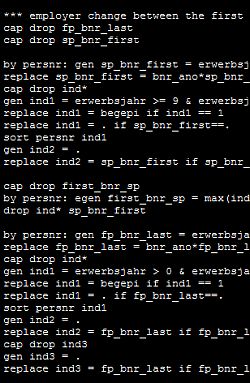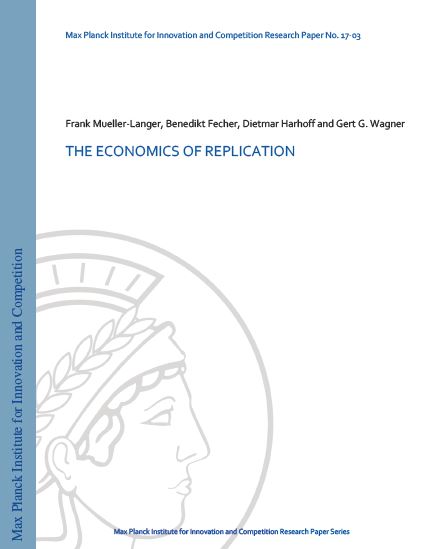Posted: February 15th, 2017 | Author: Sven | Filed under: Data Sharing, found on the net | Tags: data citation | Comments Off on UK Data Service launches Syntax Upload Facility
 The UK Data Service has just released a new service called Syntax Upload Facility. The Syntax Upload Facility enables researchers to upload and share syntax they create using UK Data Service data, building a library of syntax for other users to utilise and cite. The new Syntax Upload Facility aims to enhance researcher’s work and provide an opportunity to increase the impact of research through having syntax used and cited by others. UK Data Service also suggests how to cite these syntax-files. In addition, the syntax itself has a DOI, what promotes uniform citation standards.
The UK Data Service has just released a new service called Syntax Upload Facility. The Syntax Upload Facility enables researchers to upload and share syntax they create using UK Data Service data, building a library of syntax for other users to utilise and cite. The new Syntax Upload Facility aims to enhance researcher’s work and provide an opportunity to increase the impact of research through having syntax used and cited by others. UK Data Service also suggests how to cite these syntax-files. In addition, the syntax itself has a DOI, what promotes uniform citation standards.
The syntax created using our datasets can be uploaded by clicking Contribute your syntax/code at the bottom of the respective catalogue records. Once logged in, the syntax files can be uploaded in various formats including SPSS, Stata, SAS and R.
The Syntax Upload Facility then automatically creates a citation and a file which can be downloaded by other users. The new facility is particularly useful for researchers, students and those teaching with data. An example is available here.
Read the rest of this entry »
Posted: February 14th, 2017 | Author: Sven | Filed under: Data Sharing, EDaWaX, journals | Tags: replication studies, research paper | Comments Off on New Working Paper published: ‘The Economics of Replication’
 Frank Mueller-Langer, Benedikt Fecher, Dietmar Harhoff and Gert G. Wagner have published a new working paper on the ‘economics of replication’.
Frank Mueller-Langer, Benedikt Fecher, Dietmar Harhoff and Gert G. Wagner have published a new working paper on the ‘economics of replication’.
In the abstract of the paper, the researchers state:
“Replication studies are considered a hallmark of good scientific practice. Yet they are treated among researchers as an ideal to be professed but not practiced. To provide incentives and favorable boundary conditions for replication practice, the main stakeholders need to be aware of what drives replication. Here we investigate how often replication studies are published in empirical economics and what types of journal articles are replicated. We find that from 1974 to 2014 less than 0.1% of publications in the top-50 economics journals were replications. We do not find empirical support that mandatory data disclosure policies or the availability of data or code have a significant effect on the incidence of replication. The mere provision of data repositories may be ineffective, unless accompanied by appropriate incentives. However, we find that higher-impact articles and articles by authors from leading institutions are more likely to be subject of published replication studies whereas the replication probability is lower for articles published in higher-ranked journals.”
The paper is available here.
Read the rest of this entry »
 The UK Data Service has just released a new service called Syntax Upload Facility. The Syntax Upload Facility enables researchers to upload and share syntax they create using UK Data Service data, building a library of syntax for other users to utilise and cite. The new Syntax Upload Facility aims to enhance researcher’s work and provide an opportunity to increase the impact of research through having syntax used and cited by others. UK Data Service also suggests how to cite these syntax-files. In addition, the syntax itself has a DOI, what promotes uniform citation standards.
The UK Data Service has just released a new service called Syntax Upload Facility. The Syntax Upload Facility enables researchers to upload and share syntax they create using UK Data Service data, building a library of syntax for other users to utilise and cite. The new Syntax Upload Facility aims to enhance researcher’s work and provide an opportunity to increase the impact of research through having syntax used and cited by others. UK Data Service also suggests how to cite these syntax-files. In addition, the syntax itself has a DOI, what promotes uniform citation standards.
 Frank Mueller-Langer, Benedikt Fecher, Dietmar Harhoff and Gert G. Wagner have published a new working paper on the ‘economics of replication’.
Frank Mueller-Langer, Benedikt Fecher, Dietmar Harhoff and Gert G. Wagner have published a new working paper on the ‘economics of replication’.





